
|
Keywords: gamma ray, halo, Milky Way
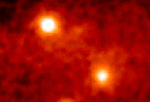 Gamma Ray Crab, Geminga
Gamma Ray Crab, Geminga
24.06.1995
What if you could "see" in gamma-rays? If you could, these two spinning neutron stars or pulsars would be among the brightest objects in the sky. This computer processed image shows the Crab Nebula pulsar (below and right of center) and the Geminga pulsar (above and left of center) in the "light" of gamma-rays.
 Milky Way Galaxy Doomed: Collision with Andromeda Pending
Milky Way Galaxy Doomed: Collision with Andromeda Pending
6.06.2022
Will our Milky Way Galaxy collide one day with its larger neighbor, the Andromeda Galaxy? Most likely, yes. Careful plotting of slight displacements of M31's stars relative to background galaxies on recent Hubble...
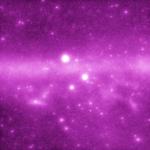 GLAST Gamma Ray Sky Simulation
GLAST Gamma Ray Sky Simulation
22.07.2000
What shines in the gamma-ray sky? This simulated image models the intensities of gamma rays with over 40 million times the energy of visible light, and represents how the sky might appear to the Gamma-ray Large Area Space Telescope (GLAST) after its first year in orbit.
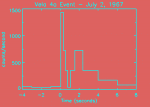 Gamma Ray Burst: A Milestone Explosion
Gamma Ray Burst: A Milestone Explosion
2.07.2000
Gamma-Ray Bursts (GRBs) were discovered by accident. Thirty three years ago today, satellites first recorded a GRB. The data plotted here show that the count rate of the satellite gamma-ray instrument abruptly jumped indicating a sudden flash of gamma-rays.
 Glory and Fog Bow
Glory and Fog Bow
3.08.2024
On a road trip up Mount Uludaд in Bursa province, Turkey these motorcyclists found themselves above low clouds and fog in late June. With the bright Sun directly behind them, the view down the side of the great mountain revealed a beautiful, atmospheric glory and fog bow.
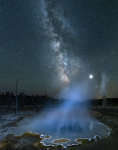 Milky Way over Yellowstone
Milky Way over Yellowstone
29.01.2020
The Milky Way was not created by an evaporating lake. The pool of vivid blue water, about 10 meters across, is known as Silex Spring and is located in Yellowstone National Park in Wyoming, USA. Steam rises off the spring, heated by a magma chamber deep underneath known as the Yellowstone hotspot.
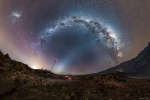 Milky Way and Zodiacal Light over Chile
Milky Way and Zodiacal Light over Chile
9.03.2020
What is the band of light connecting the ground to the Milky Way? Zodiacal light -- a stream of dust that orbits the Sun in the inner Solar System. It is most easily seen just before sunrise, where it has been called a false dawn, or just after sunset.
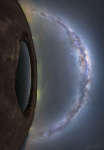 Eye on the Milky Way
Eye on the Milky Way
21.04.2020
Have you ever had stars in your eyes? It appears that the eye on the left does, and moreover it appears to be gazing at even more stars. The featured 27-frame mosaic was taken last July from Ojas de Salar in the Atacama Desert of Chile.
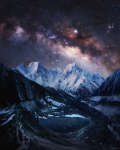 The Milky Way over Snow Capped Himalayas
The Milky Way over Snow Capped Himalayas
26.05.2020
WhatБs higher than the Himalayas? Although the Himalayan Mountains are the tallest on planet Earth, they don't measure up to the Milky Way. Visible above the snow-capped mountains in the featured image is the arcing central band of our home galaxy.
 Milky Way over the Pinnacles in Australia
Milky Way over the Pinnacles in Australia
11.10.2020
What strange world is this? Earth. In the foreground of the featured image are the Pinnacles, unusual rock spires in Nambung National Park in Western Australia. Made of ancient sea shells (limestone), how these human-sized picturesque spires formed remains unknown.
|
January February March April May June July August September October November |
|||||||||||||||||||||||||||||||||||||||||||||||||